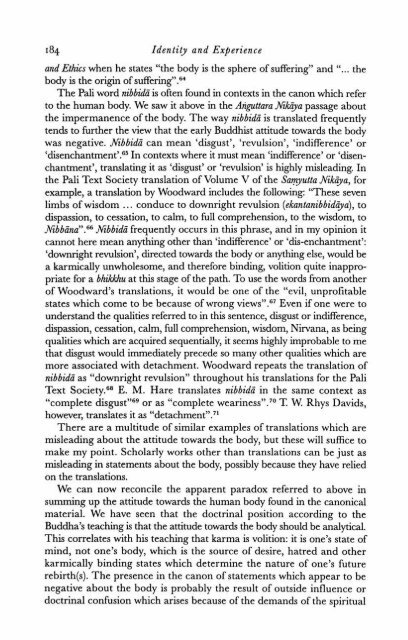Identity and Experience_Hamilton_1996
Identity and Experience_Hamilton_1996
Identity and Experience_Hamilton_1996
Create successful ePaper yourself
Turn your PDF publications into a flip-book with our unique Google optimized e-Paper software.
184 <strong>Identity</strong> <strong>and</strong> <strong>Experience</strong><br />
<strong>and</strong> Ethics when he states "the body is the sphere of suffering" <strong>and</strong> "... the<br />
body is the origin of s~ffering".~~<br />
The Pali word nibbdii is often found in contexts in the canon which refer<br />
to the human body. We saw it above in the Ariguttara NiluZya passage about<br />
the impermanence of the body. The way nibbidti is translated frequently<br />
tends to further the view that the early Buddhist attitude towards the body<br />
was negative. Nibbidii can mean 'disgust', 'revulsion', 'indifference' or<br />
'di~enchantment'.~~ In contexts where it must mean 'indifference' or 'disen-<br />
chantment', translating it as 'disgust' or 'revulsion' is highly misleading. In<br />
the Pali Text Society translation of Volume V of the Samyutta Nikga, for<br />
example, a translation by Woodward includes the following: "These seven<br />
limbs of wisdom . . . conduce to downright revulsion (ekantanibbidqa), to<br />
dispassion, to cessation, to calm, to full comprehension, to the wisdom, to<br />
JVibbZna"." Nibbida' frequently occurs in this phrase, <strong>and</strong> in my opinion it<br />
cannot here mean anything other than 'indifference' or 'dis-enchantment':<br />
'downright revulsion', directed towards the body or anything else, would be<br />
a karrnically unwholesome, <strong>and</strong> therefore binding, volition quite inappropriate<br />
for a bhihkhu at this stage of the path. To use the words from another<br />
of Woodward's translations, it would be one of the "evil, unprofitable<br />
states which come to be because of wrong views".67 Even if one were to<br />
underst<strong>and</strong> the qualities referred to in this sentence, disgust or indifference,<br />
dispassion, cessation, calm, full comprehension, wisdom, Nirvana, as being<br />
qualities which are acquired sequentially, it seems highly improbable to me<br />
that disgust would immediately precede so many other qualities which are<br />
more associated with detachment. Woodward repeats the translation of<br />
nibbidii as "downright revulsion" throughout his translations for the Pali<br />
Text So~iety.~~ E. M. Hare translates nibbidti in the same context as<br />
"complete or as "complete wearine~s".~~ T W. Rhys Davids,<br />
however, translates it as "deta~hrnent".~'<br />
There are a multitude of similar examples of translations which are<br />
misleading about the attitude towards the body, but these will suffice to<br />
make my point. Scholarly works other than translations can be just as<br />
misleading in statements about the body, possibly because they have relied<br />
on the translations.<br />
We can now reconcile the apparent paradox referred to above in<br />
summing up the attitude towards the human body found in the canonical<br />
material. We have seen that the doctrinal position according to the<br />
Buddha's teaching is that the attitude towards the body should be analytical.<br />
This correlates with his teaching that karma is volition: it is one's state of<br />
mind, not one's body, which is the source of desire, hatred <strong>and</strong> other<br />
karmically binding states which determine the nature of one's future<br />
rebirth(s). The presence in the canon of statements which appear to be<br />
negative about the body is probably the result of outside influence or<br />
doctrinal confusion which arises because of the dem<strong>and</strong>s of the spiritual


